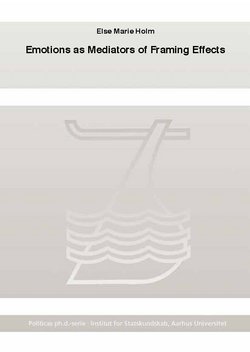Else Marie Holm
Emotions as mediators of framing effects

In recent years, there has been an increased focus on how politicians use emotional appeals to the public – and with good reasons because emotional appeals are all around us. Politicians intentionally seek to use words and news stories which are likely to evoke certain emotions; the media follow in their footsteps as they are also aware that emotions will attract viewers or sell newspapers.
Despite this increased interest, we know surprisingly little about the role of emotions in framing theories. This thesis examines how political communication affects people’s emotions by emphasizing certain aspects of an issue while ignoring others. The main contention is that these emotions mediate framing effects and affect the decision-making process.
This thesis draws on several theoretical approaches: the appraisal approach, the affect-as-information approach and the affective intelligence approach. Using these approaches, this study sets out a new theoretical model which is tested in three survey experiments. Based on the results of these survey experiments, it is concluded that frames affect emotions, the type and intensity of the emotional reactions can be controlled, and the effect of frames is partly mediated by emotions. Finally, anxiety appears to increase people’s responsiveness to framing effects.
Udgivet januar 2012
![]() Ophavsretten tilhører Politica. Materialet må ikke bruges eller distribueres i kommercielt øjemed.
Ophavsretten tilhører Politica. Materialet må ikke bruges eller distribueres i kommercielt øjemed.